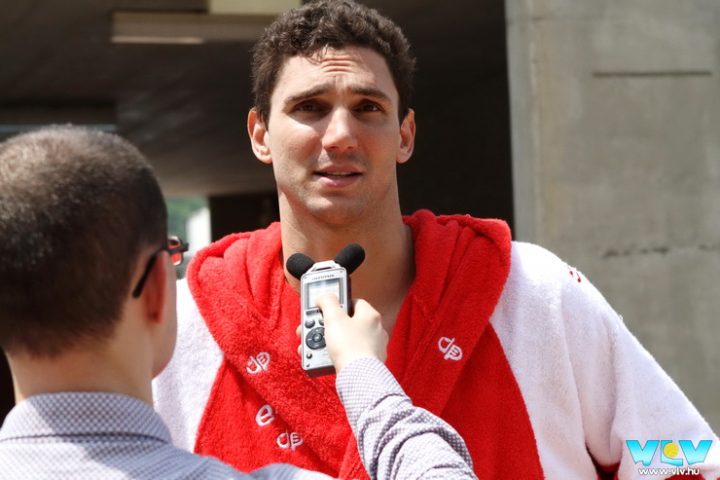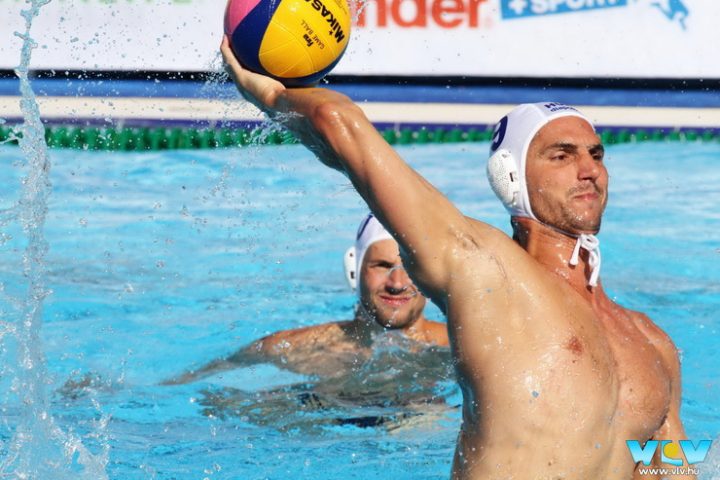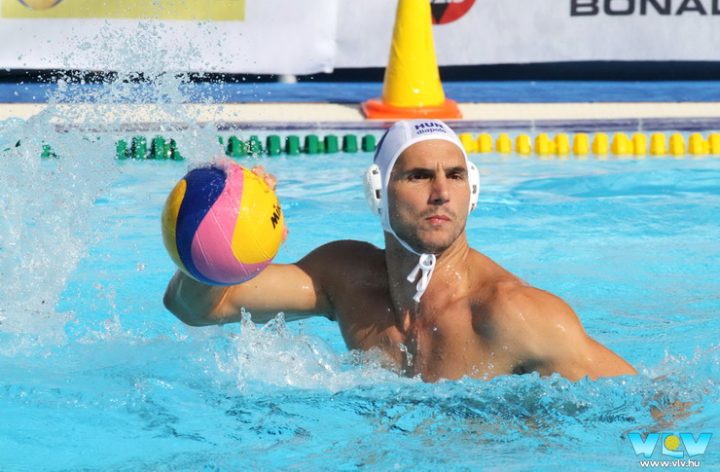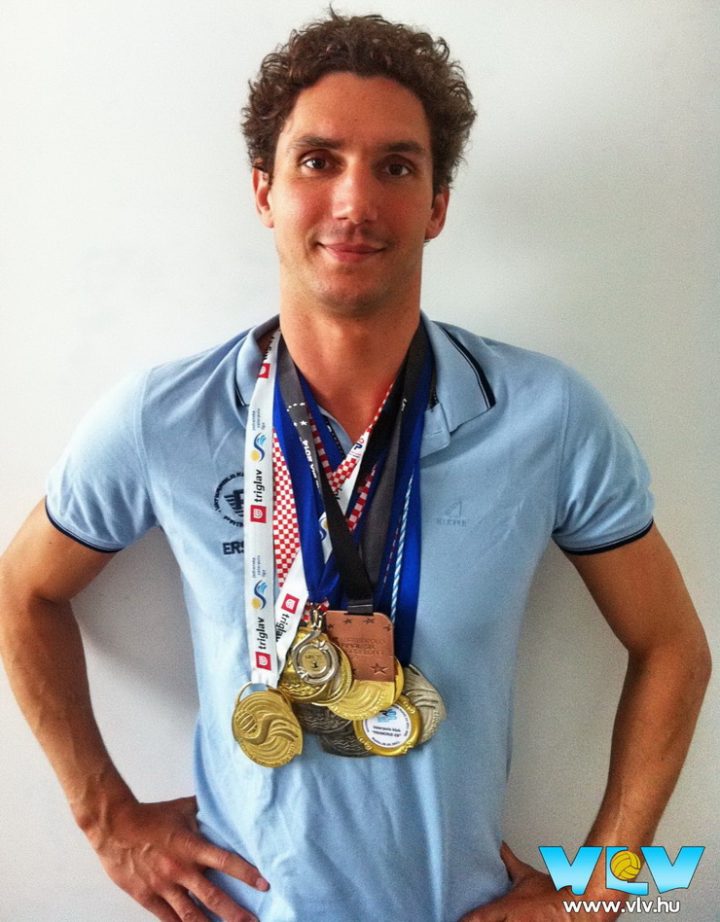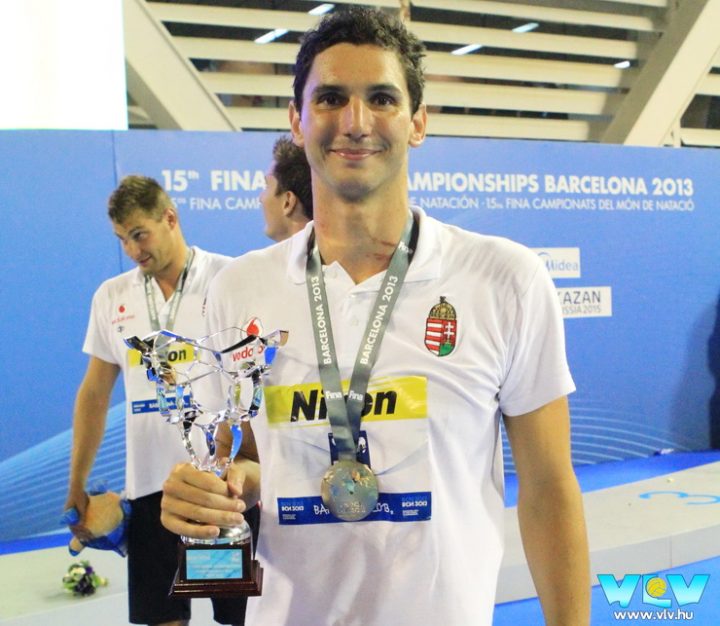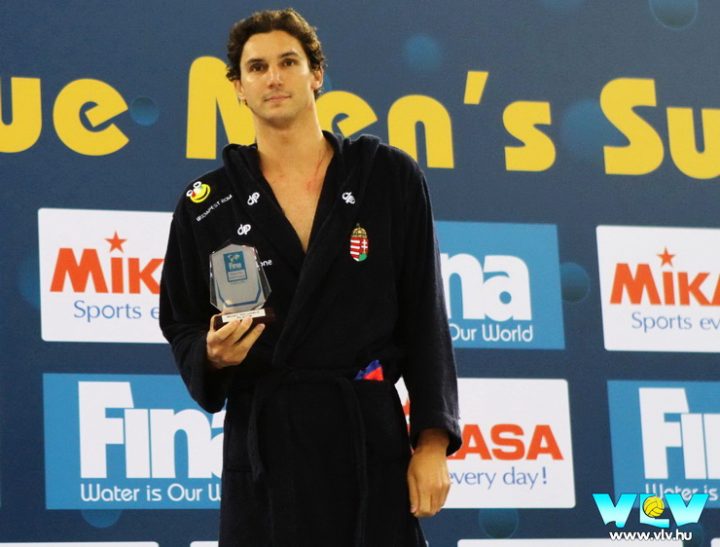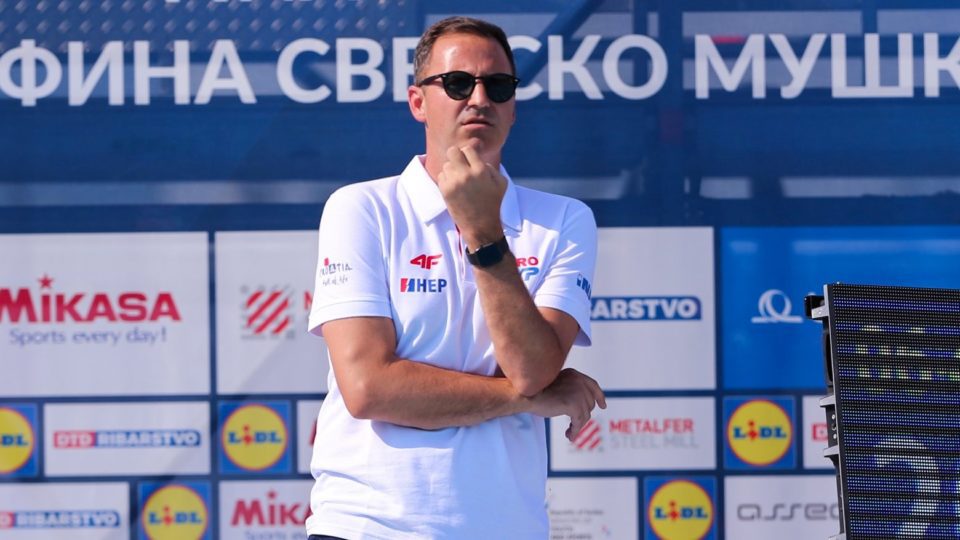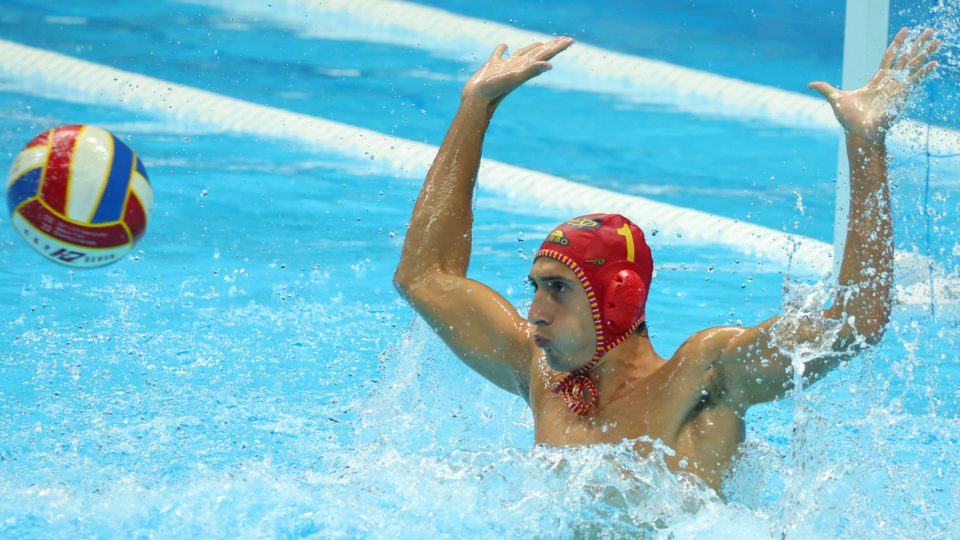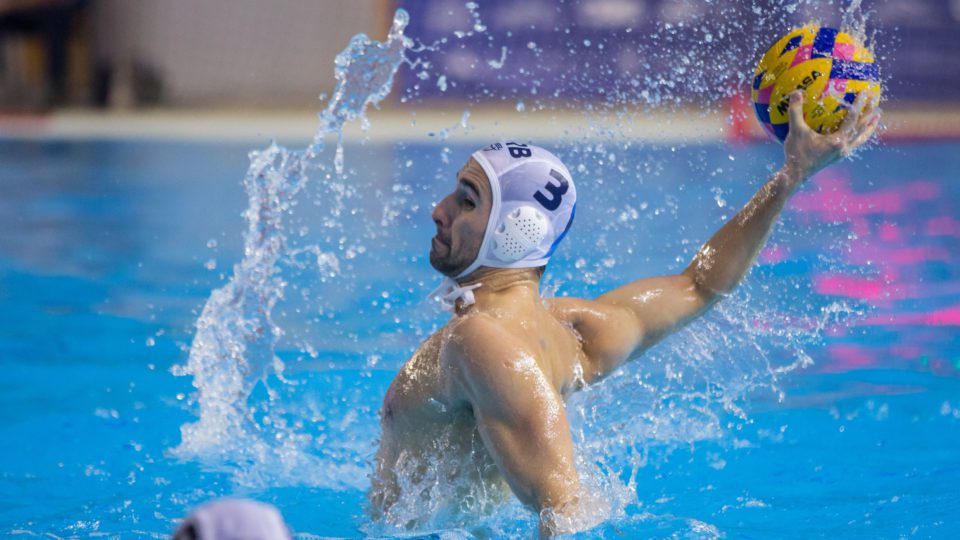Another great interview comes from vlv.hu. Even though he’s not even 35 yet, Daniel Varga announced his retirement last Monday. With his dreams already realized in Ferencvárosi, he is now fully responsible for the youth team of the club. The details of the process leading to change, lots of nostalgia, and detailed insights come in an interview with the new trainer.
Dániel Varga — Gold Olympic Player
The announcement for your retirement came quite unexpected. There were some hints, but the decision was still developing?
The announcement may have been unexpected, but I’ve made the decision a couple of months ago. The idea grew in me with every day, slowly, over the years.
What led you into making such a decision?
Since I remember, I was sure I wanted to be a coach one day, and I’ve been wanting it for decades now. Finally, I have the opportunity to do so. Of course, this doesn’t justify my leaving at the age of 35, but many things occurred. On one hand, my water polo career has become a stretched bow that makes me feel it’s not worth “pulling” further. There are certain things that are still fun, but overall I do not have the feeling I used to have before.
Is the joy of the game gone for you?
It’s not gone, but it’s transformed. I didn’t have trouble with it the last few years. I’ve always enjoyed being “Varga Dani”, but things have changed and I don’t really feel it anymore. This wasn’t such a big problem before, but now I can’t be someone I’m not anymore.
Is there an example you’d like to share? Something to explain what this is about?
In the high point of my career, I lived for the game. In many cases, I was the team captain, and even when I wasn’t, I was often an initiator of tactics in my team’s play. I always thought that this kind of performance requires training in some aspects, but it came naturally to me. At that time I felt really good, not only because of my goals and assists but because of team’s playstyle which dominated in my presence.
I can also say that, in a sense, I ended my water polo career three to four weeks before Rió. I didn’t notice it then, but that was the time I used to see if this was for me. With time I realized it’s not a role I want to play, and I’ve been in it for over a decade.
So it was a slow process — I had to find out what caused me discomfort in exercises or matches. I needed a serious analysis and had to face unpleasant facts — my weaknesses and fears. And then I realized that what I loved so much before is gone now. I was lost, at least as a player.
However, as time passed by, my sympathy toward becoming a coach intensified. I knew that the thing that made me a good player will help me in becoming a coach. I didn’t force it — there was no use of chasing former success and good memories. I’ve become someone else, but my knowledge and vision remained.
What are you looking for in coaching?
Most of all, I want to develop a complete concept for the new players. And I want to be responsible for creating a whole team and helping individuals develop.
What are the thoughts around you? What did Évi have to say about your decision?
It was a long process and of course, he was going through it with me. We talked a lot about it. In the professional part, he trusted me, and in the friendly one, he supported me. All of that made me happier and more satisfied with water polo.
It looks like you’ve been wanting to become a coach for a long time?
During my career, I was able to learn from many very good coaches. They were great, but that’s not what I’ll necessarily pursue. I did not learn the most from the coaches but from my friends, which is not surprising since there are 13 of them in a team and only one coach. To sum my coaching up: I see water polo as a sport I’ve studied over the course of 20 years. Be it tactics, training methodology or, for example, pedagogy — I’ve been there.
So you decided to be a coach. Do you think you already know enough, or do you still have to learn?
You can always be more prepared, but I think I’m ready for this. And this isn’t something small, on contrary. But after the training sessions, the matches, and as time passes, I’ll be able to give you a better answer. I am addicted to tracking my progress day by day, and this new situation will be my new test.
It seems your new life has begun. But what is the official date?
On the 2nd of July, I’ll start with then nine-week summer preparations at Fradi.
How many young players are in your group?
15-16. We’ll be having abroad camps for two times this summer. When the Championship starts in September, according to my plans, we’ll begin with some new training systems.
You said a lot about the new training systems you vouch for. What exactly is your goal?
In Fradi, my goal is to train players for the senior team. Later, I intend to train them for the Hungarian national team. These are my current interests I intend to start as soon as possible.
Can you give us more details about that?
I’m currently thinking about my players to be in OB1 and also in the other leagues. That’s the most important thing for successful championships. Of course, the two goals are not exclusive, and I don’t want to separate them.
This is very important for younger players because all of them need to master the key elements of water polo, which they best learn at the younger age. There are no immediate results coming out of it, but for the future players, it’s the most important factor.
Considering what you just said, how will you measure your results?
It’s hard to measure it at the moment. I see how players develop over time, and I know it can’t be done only in one summer. We’ll have to wait for the spring to see the full results. These outcomes are the essence of today’s water polo. For kids, I know it’s very important to win the final tournament. The kids, their parents, and coaches value this, but it’s not so crucial in the long run.
When we think about the future, we have to know that cannot measure our job only by “spectacular” results. It’s the quality of play that matters, and those who know that are on the higher level in water polo.
A coach who starts his career right after retiring as a player will obviously not give up on younger players. Do you have an imagined path on which you’ll take the players?
I have no short paths, only long-term plans. I’m looking at this as a “project” in a period of three years — as long as my contract lasts. Most of my team’s players are born in 2002 and they have the best years in front of them. My goal is to make them love water polo. I have no intention of working on myself as much as I have to work with them.
Of course, I don’t want to be hypocritical. If after a successful start a good opportunity occurs, it would be foolish to reject it.
Perhaps the most accurate wording is that I will not be a coach because I quit water polo, but stopped playing because I want to be a coach. I want to do this. I chose these guys because I see future in them and I think that with good work we can achieve serious results. In the end, these results will serve the interests of Fradi and the Hungarian water polo.
So your new players know you personally? No just from TV?
We met at the swimming pool already. We had pleasant conversations and I acted to be “incognito”.
Did they not know you are about to be their coach?
No, not yet. But they will know soon enough.
How are you feeling about this? Do you feel sad or liberated? Can you tell us about the characteristics of today’s Varga Daniel?
I have my freedom, and I’m looking forward to being a coach. My days are now filled with preparations. I have a vision of how is this going to function and have written down most of the summer program.
It’s been three weeks since the Champions Final Eight and, even though I remember it well, I’m more looking forward to the future. I was excluded on May 26th in the fifth FTC-Szolnok match. That evening a laid in my bed as a player and woke up in the morning as a coach. It was a great feeling.
That’s a really big change. Did it take a long time to process it?
Of course. And I found that I’ve changed a lot in the past twenty years. The former young player, who was a little bit spoiled by his talent, learned how much work he needed to do to become a great player. Despite all the talent.
I played 25 seasons, 16 of which I’ve been a finalist. I won eight of them and I’m pretty proud of that long list.
Are there any memories you’re glad to remember?
I won four championships after the club has been waiting for the title for a long time. When we first won it, I played in Vasas, and it’s been 18 years without a title (1989-2007). Later, in Rijeka, we ended a sixty-six-years-long waiting by becoming champions. For Ferencváros, it’s been 18 years until we got our hands on the gold medal. These results are important to be. The first memory is always special, and so I remember it whenever I think of my career.
I also often remind myself of the day when I took the Fradi’s leadership. It was at the beginning of the season and it was a gift to me. On many occasions, especially after training, I was happy to be where I was. And everything great happened here in Bela Komjadi pool!
For nine years, I’ve been a Vasas’ player, and when I became an adult, I became an Olympic champion. But those memories drift off easily. It’s difficult to recall them all after such a long time. I share 17-years-old memories with some of the players who I consider my friends.
I played with a lot of legends, even with Manuel Estiart! It happened in my first international match against Barceloneta while wearing the colors of Újpest — I was 16 and he was 40. And Estiarte “got me”. I’ll never forget that. By the way, even then, he was quite old and did not do anything in the whole game, but still, it was a miracle! And how grateful I was: the next day in the newspaper, besides the usual report, there was a photo in which I’m playing against Estiartet! Incredible! My senior career started well.
I have an immense number of memories, but you asked me about my first ones. Well, all together, they are a chain of memories, one brings the other.
It’s very interesting you did not talk about the Olympics or the Beijing gold… There’s no bigger event than the Olympic gold, and you don’t mention it.
I don’t really have a certain order of importance. Maybe when we talk a later, I’ll begin with the Olympics. I knew I could win with the players I grew up with and watched them on TV. We shared training sessions, games, tournaments, and in the end, the podium. Of course, there are the goals I scored in the matches.
There’s also the Barcelona World Cup when I had the honor to raise the trophy as a captain. Those years were the culmination of my career. Not based on my winning, but on my quality as a player. I’ve been enjoying playing water polo and I lived for it.
So that part of your career is done. What comes next?
I imagine life has three stages and my first stage is over. It includes my childhood, becoming an adult, the start of my water polo career, my family and home. In the middle of the summer, I’ll be a father of two! That’s the end of the first stage of my life and it has been perfect.
The second stage is about trying at least one other job and sticking with it for some time. I already have some ideas, but this is a whole new phase to which I’m not used to. It also involves the education of my children and preparing for the third stage of my life — the old age. And if it all succeeds, I’ll be a happy man in the third stage.



![[WATER POLO LEGENDS] Dániel Varga: "I Won't Be a Coach Because I Stopped Playing, It's The Other Way Around!"](https://total-waterpolo.com/wp-content/uploads/2018/06/11469-1200x480.jpg)
